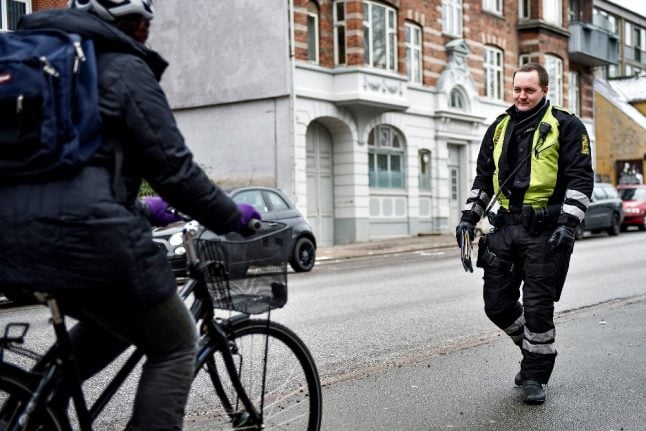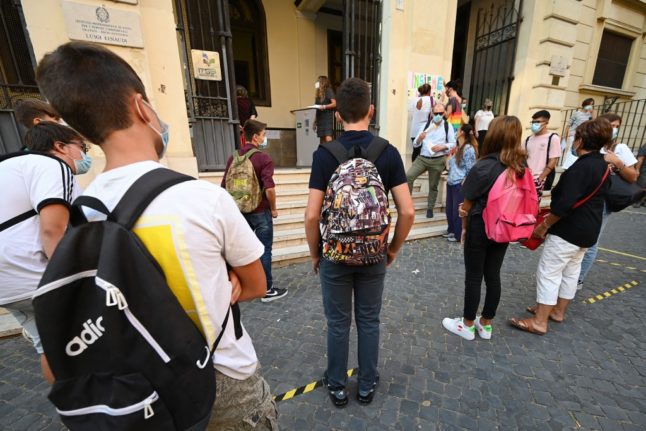1. Public transport tickets
You must, at all times, have a ticket or check-in with your rejsekort when travelling on public transport. Unlike the New York subway, the London Tube and the Paris Metro, there are no turnstiles or checkpoints on the Danish metro or train stations. It is your responsibility to remember to put your rejsekort over the check-in scanners scattered around the stations before entering the train or metro.
If you don’t have a rejsekort, you need to buy a ticket from one of the ticket machines or through your phone on the DOT ticket app. Running and jumping on the first metro you see to save time, before you’ve got your rejsekort out of your pocket or bought a ticket on your phone, is a risky move.

You must check in your rejsekort or have a ticket before boarding a train. Photo: Liselotte Sabroe/Scanpix 2014
Phone signal is patchy and ticket inspectors enter public transport at random, wearing all black and holding their machines for you to prove your type of ticket. If your rejsekort hasn’t been checked-in, despite having money on the card, if your phone is in the middle of trying to complete a ticket purchase but has frozen, you’re getting a fine for 750 DKK, no excuses.
For buses, the same applies but you can check-in anywhere on a bus, so you don’t need to get on at the front. If you don’t have enough money on your rejsekort, you’ll soon find out by a loud low buzz noise when you try to check-in, alerting everyone to your trespassing status.
You then need to go to the front of the bus and pay the required amount in cash or show a mobile ticket. If you don’t have cash, and signal on your phone is preventing a quick online purchase, you can either sweat it out or get off the bus.
2. Cycling
Life in Denmark is synonymous with being on a bike. It’s easy to get complacent about it when it’s something you do automatically every day but there are rules.

Cyclists on Dronning Louises Bro, Copenhagen. Photo: Thomas Lekfeldt/Ritzau Scanpix
You can risk getting a fine between 700 and 1500 DKK if you:
– Walk with your bike in the bike lane rather than cycling.
– Cycle without both lights on during dark hours or during low visibility.
– Cycle with another person on a one-person bike that isn’t a child in a child seat.
– Hold onto another vehicle or person in another vehicle while cycling.
– Hog the bike lane, chatting to your friend cycling next to you, when others need to overtake.
– Talk on your mobile phone when cycling.
– Cycle when drunk. The police decide on your level of drunkenness rather than there being a legal limit. But if they think you’re more than a little tipsy, you’ll be getting a 1500 DKK fine and walking home.
3. Cannabis
Despite the whiff of weed in Christiania, cannabis is illegal across the whole of Denmark.

Pusher Street in Christiania. Photo: Anne Bæk / Ritzau Scanpix
The hippy and autonomous Copenhagen district of Freetown Christiania is both a tourist spot and a residential area where cannabis is often openly traded along the infamous Pusher Street – an area where tourists are forbidden from taking photos.
But despite the set of written and unwritten rules in Christiania, cannabis remains illegal and police have been known to check the area and crack down on it.
There is so much more to Christiania than the pop-up hash stalls so don’t let it put you off from exploring and enjoying the history and landscape of this area.
4. Jaywalking

Photo: Erik Jepsen/Ritzau Scanpix
You’re in a rush, there are no cars around, it’s practically midnight and the pedestrian crossing light has turned red. What should you do? Nimbly dash across the road, saunter confidently across, or wait diligently for the light to turn green? Well if you’re in Denmark you wait. Every time.
You will rarely see a Dane crossing a red light, because they follow rules. And the rules are that if you are found crossing a red light as a pedestrian you’ll get a 700 DKK fine.
If you’re tempted to chance it, expect disapproving looks. And remember that you’re not just dodging cars and a fine if you cross a red light; you’re dodging bikes, probably quite a lot of them.
5. Parking your car

Unlawfully parked vehicles can result in a fine of 510 DKK. Photo: Simon Bohr/Ritzau Scanpix
The rules are very particular on this one. If you’re parked over by a few centimetres of a metre, you’ll very likely get a parking fine. So be aware that parking is not allowed when your vehicle is:
– Less than five metres from a pedestrian crossing or end of a cycle path and less than 10 metres from an intersection.
– At full-drawn centrelines where the distance between the line and the car is less than three metres.
– On cycle paths and pedestrian crossings.
– At bus stops where the kerb is painted yellow or within 12 metres of a bus stop sign.
Maybe keep a tape measure in the car…?
And don’t forget, drive on the right hand side of the road and if you’re from outside an EU or EEA country, you need to exchange your driving license after 90 days of living in Denmark.
Happy rule-keeping.



 Please whitelist us to continue reading.
Please whitelist us to continue reading.
Foreigners? I see Danes breaking one or more of these laws on a regular basis.